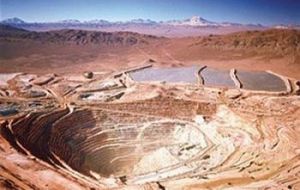MercoPress. South Atlantic News Agency
Lack of water conditions future of Chile's mining industry
 Minera Escondida
Minera Escondida Sergio Gonzalez, one of four Chileans working with the United Nations Intergovernmental Panel on Climate Change (IPCC), warned this week that the economic future of Chile's mining industry cannot be sustained unless the nation deals seriously with its growing water shortage.
An investigator for the Santiago-based Institute of Agricultural Investigations, Gonzalez works both with the U.N.'s IPCC (the organization that shared the 2007 Nobel Peace Prize with environmental activist Al Gore) on global warming issues and with Chile's scientific community in seeking solutions to environmental issues specific to the nation. "The risk of a major desertification in the north and an advancing desertification in the central zone, including the Metropolitan Region is growing," said Gonzalez. "Using water from river and wetland sources for mining needs is simply unsustainable." Gonzalez urged Chile's mining industry to convert, instead, to desalinize ocean water. "I'm not saying that sea water necessarily should be required of all mining companies, just that they be required to find a water source other than rivers and wetlands," he said. "Right now the only mining company that uses desalinized sea water is Minera Escondida," Gonzalez pointed out. "They are doing the right thing and yet they are the ones suffering from unfair competition (â€Ã‚¦) Copper is Chile's primary export and we won't be able to sustain this industry unless we stop exploiting our water resources." In a conversation reported by the daily La Nacion, Gonzalez also offered his thoughts on how Chile's National Environmental Commission (CONAMA) should combat climate change: "We need to develop medicines for water-borne diseases, because as the temperatures rise around the world, contagious biological strains will rise as well. We also need to work on reforestation, which goes hand in hand with reducing carbon emissions." As an active IPCC member, Gonzalez also has a global perspective on climate change, saying, "It is very important that people take IPCC data seriously. If anything, our predictions have been very conservative. The magnitude of climate change is going to accelerate and become more urgent and we will have to take definitive measures." "As for the Kyoto Protocol – while I don't know the extent to which it will help, countries should have enough time to reorganize and complete their goals before 2012, even though one particular country chose not to sign the agreement," said Gonzalez, in reference to the U.S. refusal to sign the Kyoto Protocol. Gonzalez also expressed doubts regarding the viability of nuclear power in Chile, and urged the nation to convert as soon a possible to wind energy. "Although no perfect solution exists for our energy supply problems, I think we should leave nuclear energy aside as long as we can, and instead focus on wind energy," he said. The Santiago Times




Top Comments
Disclaimer & comment rulesCommenting for this story is now closed.
If you have a Facebook account, become a fan and comment on our Facebook Page!